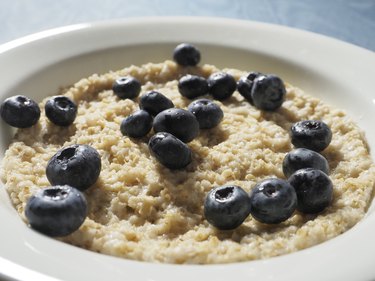
If you have irritable bowel syndrome (IBS), you know what you eat can potentially spoil your day. A scoop of ice cream or a pasta dinner might bring on painful symptoms. But oatmeal can be a good choice, as oats are not one of the carbohydrates health experts warn people with IBS to avoid.
IBS and FODMAPs
Video of the Day
IBS is the condition most commonly diagnosed by gastroenterologists; about 10 to 15 percent of Americans have it, according to the American College of Gastroenterology. It's a long-term condition that affects the large intestine, or colon. You're more likely to have IBS if you're younger than 50, have a family history of IBS or have anxiety, depression or other mental health conditions, per the Mayo Clinic.
Video of the Day
Certain foods seem to worsen symptoms. Often, people with IBS are urged to follow a low-FODMAP diet. FODMAP stands for "fermentable oligosaccharides, disaccharides, monosaccharides and polyols," according to Johns Hopkins Medicine. These carbs are present in many food items like:
- Dairy products (milk, yogurt, ice cream)
- Wheat-based foods (bread, pasta, crackers)
- Beans and legumes
- Apples and stone fruits (cherries, peaches, apricots)
- Some vegetables (onions, garlic, artichokes, asparagus)
Is Oatmeal OK to Eat?
"Oatmeal is a whole grain, contains fiber, helps with bowel movements and can reduce cholesterol," says Beth Rosen, RD, CDN, who runs Goodness Gracious Living Nutrition in Southbury, Connecticut. The soluble fiber counters diarrhea by helping give form to loose stool, she says, and it eases constipation by drawing water into the large intestine, softening hard stool and stretching the colon, which stimulates the bowel to move things along.
Cari Riker, RDN, LDN, a registered dietitian nutritionist who operates Riker Nutrition Consulting in Brentwood, Tennessee, adds that oatmeal also helps foster good gut bacteria, another health plus.
But don't just pick any oatmeal, she says. Prepackaged single servings of instant oatmeal may contain FODMAP ingredients. She recommends people with IBS eat less processed oats (such as steel-cut or rolled oats), over instant oats, particularly the sweetened and flavored varieties.
She also recommends checking labels when buying flavored oatmeal. "Peaches and cream [flavored instant oatmeal] can be a trigger for some people," Riker says. "Be mindful of ingredients."
Portion size is important as well, Rosen says, as some foods are considered low-FODMAP as long as you don't eat too much. "Quick oats can have some FODMAP ingredients," she says. "You could have a quarter-cup of quick oats, measured uncooked, without risking high FODMAP."
Lactose, the sugar that naturally occurs in milk, triggers IBS symptoms for many people, so both Rosen and Riker advise mixing in lactose-free milk or non-dairy milks, including almond, rice, hemp and oat.
While most FODMAPs are classified as types of sugar, Rosen says white sugar (sucrose) and brown sugar are fine to use. So is maple syrup, Riker says. However, Rosen says to avoid:
- Molasses
- Agave syrup
- Honey
- High-fructose corn syrup
From there, you can experiment with all sorts of IBS oatmeal recipes. As Rosen recommends, start with steel-cut or rolled oats, then:
- Top with a quarter-cup of blueberries or 2 tablespoons of raspberries, Rosen says, but skip blackberries — they're a high-FODMAP fruit.
- Add a spoonful of peanut butter or a handful of nuts for protein, Riker says, but stay away from cashews and pistachios.
- Mix in white or brown sugar or maple syrup for sweetness, according to Rosen and Riker.
Want the benefits of oats beyond breakfast? Steel-cut or rolled oats may be substituted for breadcrumbs in meatloaf or added to a smoothie.
Work With Your Doctor
If you suspect you may have IBS, get checked out by a gastroenterologist, Rosen says. Similar symptoms can result from other causes, such as food allergies.
Once diagnosed, a dietitian can help via a two-step process, per Johns Hopkins Medicine. First, you'll eliminate IBS trigger foods from your diet for several weeks. Then, you'll slowly add foods back in, to determine which are problems and which are fine to eat. Ultimately you'll arrive at a low-FODMAP diet tailored to your individual needs.
- American College of Gastroenterology: “Irritable Bowel Syndrome”
- Mayo Clinic: “Irritable Bowel Syndrome”
- Johns Hopkins Medicine: “FODMAP Diet: What You Need to Know”
- Beth Rosen, MS, RD, CDN, registered dietitian, owner, Goodness Gracious Living Nutrition, Southbury, Connecticut
- Cari Riker, RDN, LDN, CDE, registered dietitian nutritionist, certified diabetes educator, life coach, Riker Nutrition Consulting, Brentwood, Tennessee
Is this an emergency? If you are experiencing serious medical symptoms, please see the National Library of Medicine’s list of signs you need emergency medical attention or call 911.